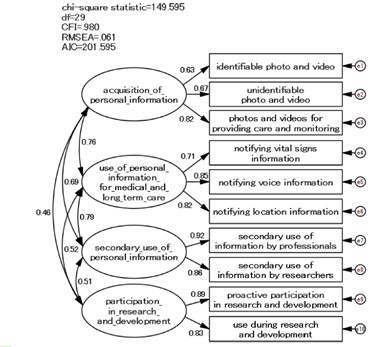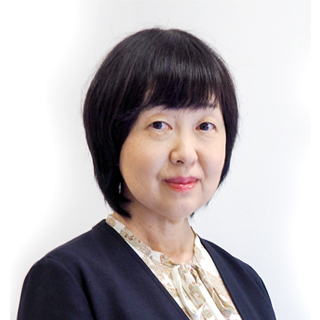Researchers develop a model that can explain the effect of users’ ethical perception on their willingness to use care robots
The global population of people older than 65 years of age is rapidly increasing the need for care. Although care robots are a promising solution to fill in for caregivers, their social implementation has been slow and unsatisfactory. A team of international researchers has now developed the first universal model that can be employed across cultural contexts to explain how ethical perceptions affect the willingness to use care robots.

Image Title: A universal ethical perception model
Image Caption: An international team of researchers has developed a universal model to relate users’ perceptions with their willingness to use care robots. The model can be applied across countries and personal attributes.
Image Credit: Sayuri Suwa from Chiba University
Image Source Link: https://www.sciencedirect.com/science/article/pii/S0167494323002157?via%3Dihub
License Type: CC BY 4.0
Countries like Japan are experiencing declining birth rates and an aging population. The increased burden of care for this aging population may lead to a shortage of caregivers in a decade’s time. Thus, the recruitment and allocation of resources must be planned in advance. Technological interventions in the form of robots that provide home care services to the aged appear to be a promising solution to this problem.
Although care robots are being developed and improved at a rapid pace, their social acceptance has been limited. It is suspected that the ethical issues surrounding the use of such robots may be obstructing the implementation of this technology. Many acceptance models have demonstrated that the ethical perceptions of older people, their families, and professional caregivers regarding care robots can impact their willingness to adopt this technology. However, there is no universal model that can elucidate the relationship between ethical perceptions and the willingness to use care robots across countries and cultural contexts.
To fill this knowledge gap, a team of international researchers led by Professor Sayuri Suwa from Chiba University, including Dr. Hiroo Ide from the University of Tokyo, Dr. Yumi Akuta from Tokyo Healthcare University, Dr. Naonori Kodate from University College Dublin, Dr. Jaakko Hallila from Seinäjoki University of Applied Sciences, and Dr. Wenwei Yu from Chiba University, among others, conducted a cross-sectional study across Japan, Ireland, and Finland. The findings of their study were made available online on July 25, 2023, and will be published in January 2024 in Volume 116 of the journal Archives of Gerontology and Geriatrics.
Sharing the motivation behind the study, Prof. Suwa explains, “Today, in Japan’s super-aged society, various care robots, including monitoring cameras, have been developed and marketed to compensate for the shortage of care staff and to alleviate their stress. However, there are no discussions among users—older people, family caregivers, and care staff—and developers regarding the willingness to use care robots, the protection of privacy, and the appropriate use of personal information associated with the use of care robots. The desire to improve this situation and to promote appropriate utilization of care robots beyond Japan was the impetus for this research.”
The team developed a questionnaire that examined the ethical issues that could affect the willingness to use a care robot across the three countries. The survey was conducted between November 2018 and February 2019 among older people, their family caregivers, and professional caregivers. This study was also reviewed by multiple ethical committees in all three countries. The researchers analyzed a total of 1,132 responses, which comprised 664 responses from Japan, 208 from Ireland, and 260 from Finland. They found that the willingness to use care robots was highest in Japan (77.1%), followed by Ireland (70.3%), and was lowest in Finland (52.8%).
Next, the researchers developed a conceptual model and evaluated it using statistical methods. From the questionnaire, the researchers included responses to ten items in the model, categorized into four broad domains—acquisition of personal information, use of personal information for medical and long-term care, secondary use of personal information, and participation in research and development. They then improved the model using Akaike’s information criterion (AIC). The model underwent incremental improvements to attain better (smaller) AIC values. The final model was then applied to each country.
Thus, this study demonstrated the successful use of a single universal model that could explain the correlation between ethical perceptions and social implementation of care robots across three countries with different geographies, demographics, cultures, and systems.
Discussing the importance and long-term impact of their study, Prof. Suwa concludes, “From our results, we can infer that social implementation of care robots can be promoted if developers and researchers encourage potential users to participate in the development process, proposed in the form of a co-design and co-production concept. We hope that the process of developing care robots will be improved to contribute to human well-being in a global aging society.”
About Professor Sayuri Suwa
Dr. Sayuri Suwa is a professor at the Department of Community Health Nursing, Graduate School of Nursing, Chiba University, Japan. She specializes in the research areas of gerontological and community health nursing, focusing on dementia care, home care, and ethics on assistive technology. Prof. Suwa has more than 50 publications in reputed journals, which have been accessed multiple times and an impressive citation score.
Reference:
Title of original paper: Developing a model to explain users’ ethical perceptions regarding the use of care robots in home care: A cross-sectional study in Ireland, Finland, and Japan
Authors: Hiroo Ide1, Sayuri Suwa2, Yumi Akuta3, Naonori Kodate4, Mayuko Tsujimura5, Mina Ishimaru2, Atsuko Shimamura6, Helli Kitinoja7, Sarah Donnelly4, Jaakko Hallila7, Marika Toivonen7, Camilla Bergman-Karpijoki8, Erika Takahashi9, and Wenwei Yu10
Affiliations:
- Institute for Future Initiatives, The University of Tokyo
- Department of Community Health Nursing, Division of Innovative Nursing for Life Course, Graduate School of Nursing, Chiba University
- Division of Nursing, Faculty of Healthcare, Tokyo Healthcare University
- UCD School of Social Policy, Social Work and Social Justice, University College Dublin
- Division of Visiting Nursing, School of Nursing, Shiga University of Medical Science
- Division of Community Health Nursing, Department of Nursing, Faculty of Health Science, Toho University
- Seinäjoki University of Applied Sciences
- Humana, Finland
- Graduate School of Humanities, Chiba University
- Center for Frontier Medical Engineering, Chiba University
Journal: Archives of Gerontology and Geriatrics
DOI: 10.1016/j.archger.2023.105137
Contact: Sayuri SUWA
Graduate School of Nursing, Chiba University
Email: suwa-sayuri@faculty.chiba-u.jp
Jaakko Hallila
President & CEO, Seinäjoki University of Applied Sciences
Email: jaakko.hallila@seamk.fi
Public Relations Office, Chiba University
Address: 1-33 Yayoi, Inage, Chiba 263-8522 JAPAN
Email: koho-press@chiba-u.jp
Tel: +81-43-290-2018
Recommend
-

Safeguarding Lifelines: Rapid Restoration of Infrastructure in Earthquake-Prone Japan
2024.10.21
-

Optimizing End-of-Life Happiness: The Future of Nursing through Technology
2024.05.31
-

Live on the Moon, Settle on Mars: Research Center for Space Agriculture and Horticulture for Space Food Production and Supply
2023.10.20


